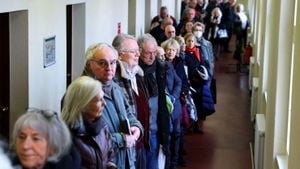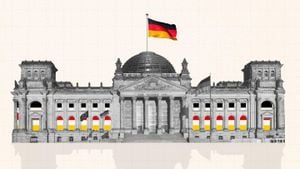The recent German federal elections have delivered significant shifts within the nation’s political structure, with the Christian Democratic Union/Christian Social Union (CDU/CSU) coalition securing victory and the Alternative for Germany (AfD) rising dramatically. This election marks one of the most consequential political landscapes since the reunification of Germany, affecting both voter representation and the formation of future coalitions.
According to initial exit polls by the ZDF, the CDU/CSU, led by Friedrich Merz, has attained 29% of the votes, marking a return to power after the long-standing tenure of Angela Merkel. Meanwhile, the AfD has gained 19.8%, doubling its previous results and positioning itself as the second-largest party within the Bundestag. The Social Democratic Party (SPD), under the leadership of Olaf Scholz, faced historical lows with just 16% of the votes, nearly ten percentage points down from the last federal election.
This election saw roughly 60 million eligible voters, with record turnout exceeding 84%, the highest since reunification. Analysts note this surge may indicate increased political engagement among citizens, reflecting dissatisfaction with the current government. The constitutional electoral system, which allows for certain parties to secure representation even below the 5% threshold, adds complexity to the situation, especially for parties like the Free Democratic Party (FDP) and the BSW, currently hovering around the threshold.
Matthias Miersch from the SPD described the evening as "very bitter" for his party and acknowledged the CDU's defined victory. Alice Weidel, the AfD candidate, triumphantly declared it as "a historical result," stating their party is prepared to take responsibility for the nation, subtly reaching out to coalition possibilities.
Following the results, Friedrich Merz emphasized the urgency to form a stable government, stating, "The world out there is not waiting for us." This reflects the consensus among electorate leaders as it gears up for the negotiations to establish the next governing coalition. The viability of forming a grand coalition (Grosse Koalition) remains uncertain, largely dependent on FDP and BSW's ability to surpass the 5% margin. If they fail, their votes would be redistributed, potentially altering the parliamentary dynamics significantly.
The predictions indicate CDU/CSU and SPD could together muster enough seats to achieve majority control - with projections showing the likelihood they could rely on additional smaller parties’ cooperation. Should the conservative coalition manage to form a government, it signifies a potential shift back to traditional political alignments within Germany.
This election outcome raises numerous questions about the future of Germany's political alliances, especially with AfD’s unprecedented presence and escalated influence. Many observers remain wary of having them involved directly in any coalition due to their right-leaning ideology, which could disrupt long-standing social and economic policies.
The initial response from the incumbent Chancellor Scholz was one of regret, stating, "I take full responsibility" for the SPD’s disappointing performance. His sentiment echoes across his party as many grapple with the ramifications of moving forward.
Despite Scholz's hopes for establishing the coalition, the prevailing sentiment indicates the necessity to acknowledge the shifting political dynamics and address voter concerns effectively. Friedrich Merz's forthcoming policies are anticipated to focus heavily on strengthening relationships with France and Poland, as he seeks to solidify Germany's position within the EU.
Looking beyond the immediate results, the next steps are pivotal for the German government to create alliances capable of governing effectively. Potential negotiation rounds will focus on the integration of smaller parties or the possibility of the dreaded opposition benches if larger coalitions remain unattainable.
The future government’s capacities to act decisively and efficiently will be put to the test against public expectations following such pivotal electoral changes. Many citizens are eagerly anticipating how the newly configured Bundestag will respond to pressing issues concerning the economy, immigration, and their broader European commitments. This election is set to redefine the political norms within Germany and could stand as a cornerstone for years to come.



